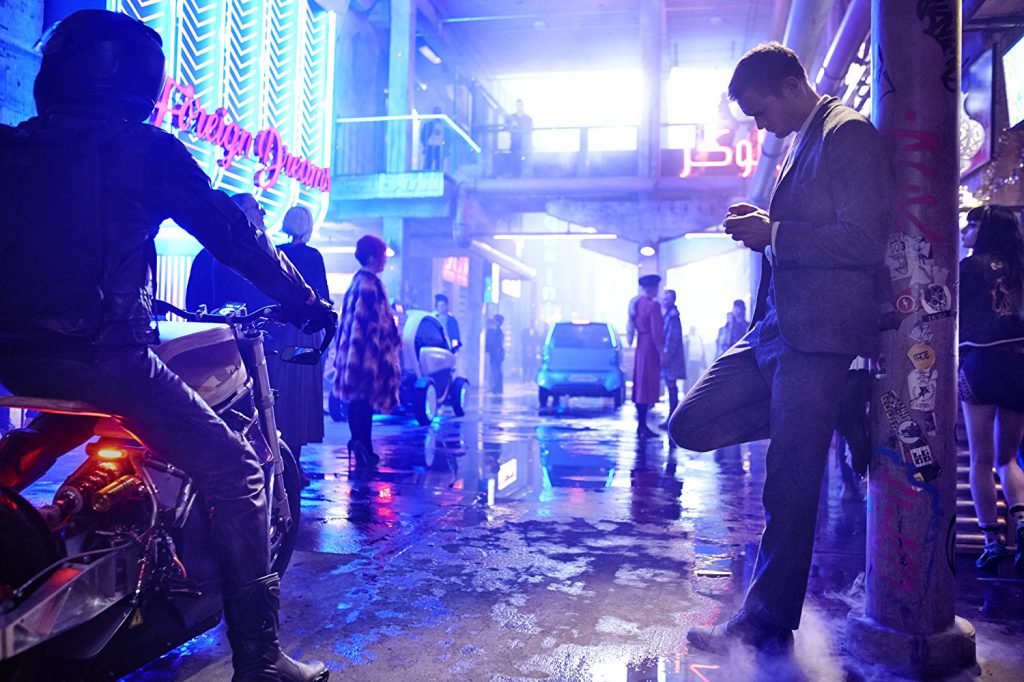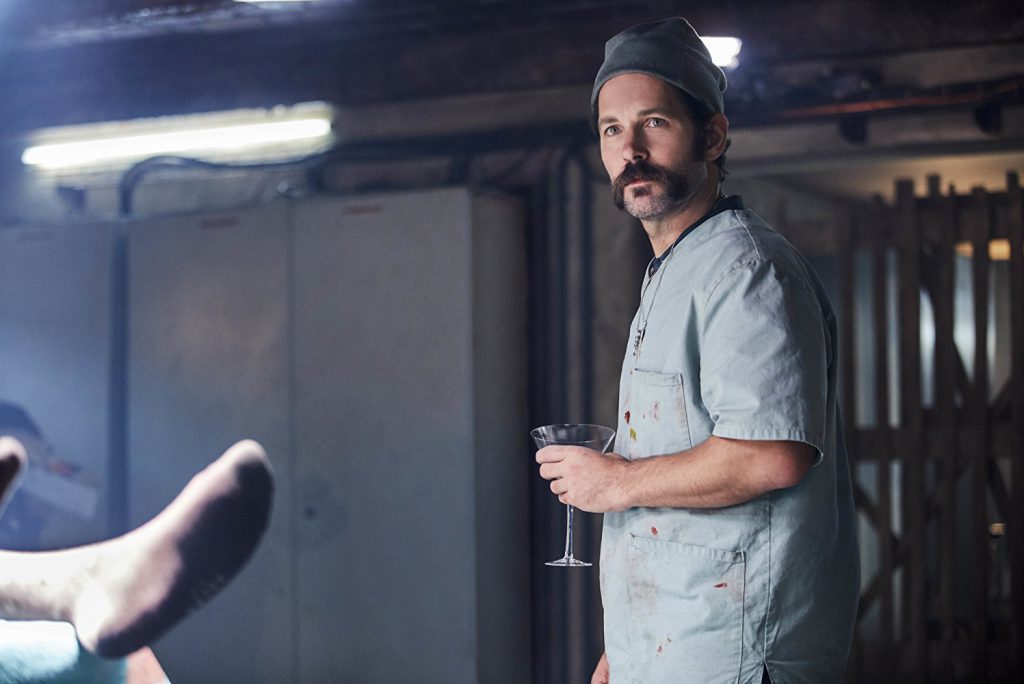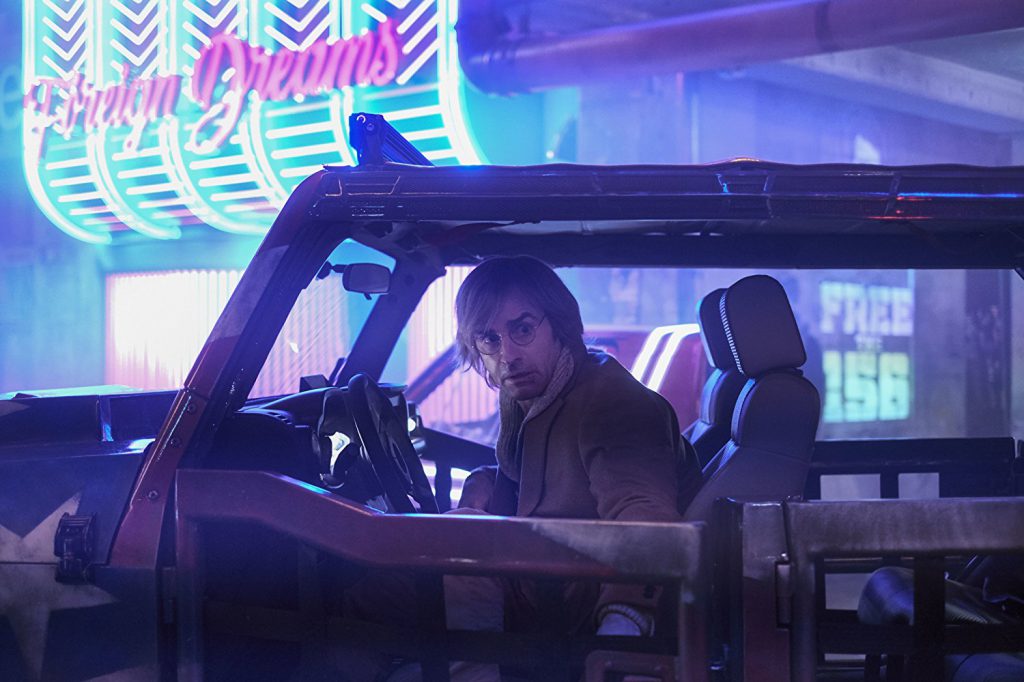Mute review: Duncan Jones’ Netflix release arrives on the streaming platform. The film follows a mute bartender who goes up against his city’s gangsters in an effort to find out what happened to his missing partner.
Mute review by Andrew Gaudion.

Mute review
Sitting down to watch Mute on the night of its release was an experience that required one to shut out the loud chorus of negative reviews that met Duncan Jones’ latest film shortly after it debuted on Netflix. Mute is a film I, and many other fans of Jones’ previous work have been looking forward to for a long-time. Set in the same universe as his debut Moon, Mute is very much a passion project for the director. Fans had hoped it would be a course correction following the big budget misfire that was Warcraft. Which is why it was difficult to see the barrage of negative reviews. Yet, off I embarked, in the hope that the film may still hold something for me. But there is no escaping just how crushing a disappointment the final product is.
Set in Berlin forty years from now, the film follows mute Amish bartender, Leo (Alexander Skarsgard) begins a search for his missing girlfriend, Naadirah (Seyneb Saleh) in a sprawling city overrun by technology and a number of mysterious and strange individuals, with two American surgeons (Paul Rudd and Justin Theroux) at the centre of Leo’s search.

Mute review
You won’t win any prizes for guessing what the cinematic touchstones are in regards to both Mute’s aesthetic and narrative. It screams Blade Runner so much, down from the set dressing, to the neon splashed Berlin landscape as Leo plods his way through the futuristic landscape, with props and vehicles taken directly from Ridley Scott’s dystopia blended with some of the sleeker touches of Jones’ own Moon. It is a fairly well-designed world, populated with a number of individuals doing a number of strange activities. But none of it matters. There is very little attempt to establish this world that for the first hour and a half your mind is simply trying to wrap itself around who everyone is, what their relationship with other characters, and just how this city and world operates.
The world building here suffers much from the same issues that plagued Jones’ Warcraft adaptation. His approach seemingly seems to be to thrust us into this world, populate it with background quirks, but beyond that he fails to flesh anything that is all that interesting, leaving you more perplexed than intrigued. Moon was low-key enough to make an impact, and Source Code is high concept enough to be fuelled by its time-warp plot device. Mute strives to be a neo-noir, but fails to provide a mystery that feels engaging, following characters whose actions often make this an uncomfortable watch whilst piecing together convenient and perfunctory clues. It is not well-paced, is rarely clever and downright nonsensical, for the most part.
Related: The Cloverfield Paradox review
There is a turn in proceedings as the film evolves into the final act where you can begin to see the type of film that Jones’ clearly wanted to make begin to emerge. The final act works in large part down to the madcap performance of Paul Rudd and the fact that it operates more on the level of a more straight-forward thriller. The first two acts barely add anything to the proceedings and only fuel a searing sense of frustration as you crawl over the finish line.

Mute review
On a performance level, only Rudd, Theroux and Skarsgard truly register, with Theroux only really making an imp[act thanks to how wildly misguide his characterisation is. Skarsgard is an interesting figure to watch. His physicality is unique and his face very sympathetic, all doe-eyed and sensitive. Yet, Leo simply doesn’t work as a noir anti-hero. His Amish background makes him a luddite in terms of technology, but the fact that he is mute rarely impacts in any truly meaningful way to truly operate beyond anything more than a gimmick. He is too closely involved with the investigation to have that removed sense of deduction classic noir detectives have, and he rarely demonstrates much in the way of skilled capabilities. He only registers thanks to Skarsgard’s presence.
Following the polarising release of The Cloverfield Paradox, Netflix probably could have done with Mute hitting it out of the park to truly content as a production company that is producing content that can rival the big screen. They seem to be tipping towards a reputation of a dumping ground studio who is picking up titles that have shown red flags to other studios. You cannot deny the fact that they are at least helping filmmakers produce original films, but simply saying a film original and different cannot excuse it from flawed storytelling.
I urge you to see Mute and form an opinion for yourselves, as there are those who finding things to enjoy in Jones’ future Berlin. But, for this reviewer, Mute stands as a frustrating, bewildering and nonsensical disappointment that offers little that feels new and fails to craft a mystery that sparks intrigue in a world that feels hazily defined.
Mute review by Andrew Gaudion, February 2018.
Mute is available on Netflix.

Latest Posts
-


Film Festivals
/ 7 hours ago‘The Last Video Store’ team Cody Kennedy, Josh Lenner & Kevin Martin discuss the journey of their film
Having debuted in the UK at 2023’s FrightFest Halloween, it has taken a little...
By Kat Hughes -


Home Entertainment
/ 8 hours ago‘Strange Darling’ UHD review: Dir. JT Mollner
THN first caught JT Mollner’s Strange Darling back in 2023 as part of Fantastic...
By Kat Hughes -


Film News
/ 10 hours agoWill Ferrell reflects on holiday classic ‘Elf’
One of our go to movies each and every December has to be Will...
By Paul Heath -


Film News
/ 3 days agoMichael Mann’s ‘The Keep’ is finally available on 4K Ultra-HD
So, here’s some brief home entertainment news in that Michael Mann’s The Keep is...
By Paul Heath














